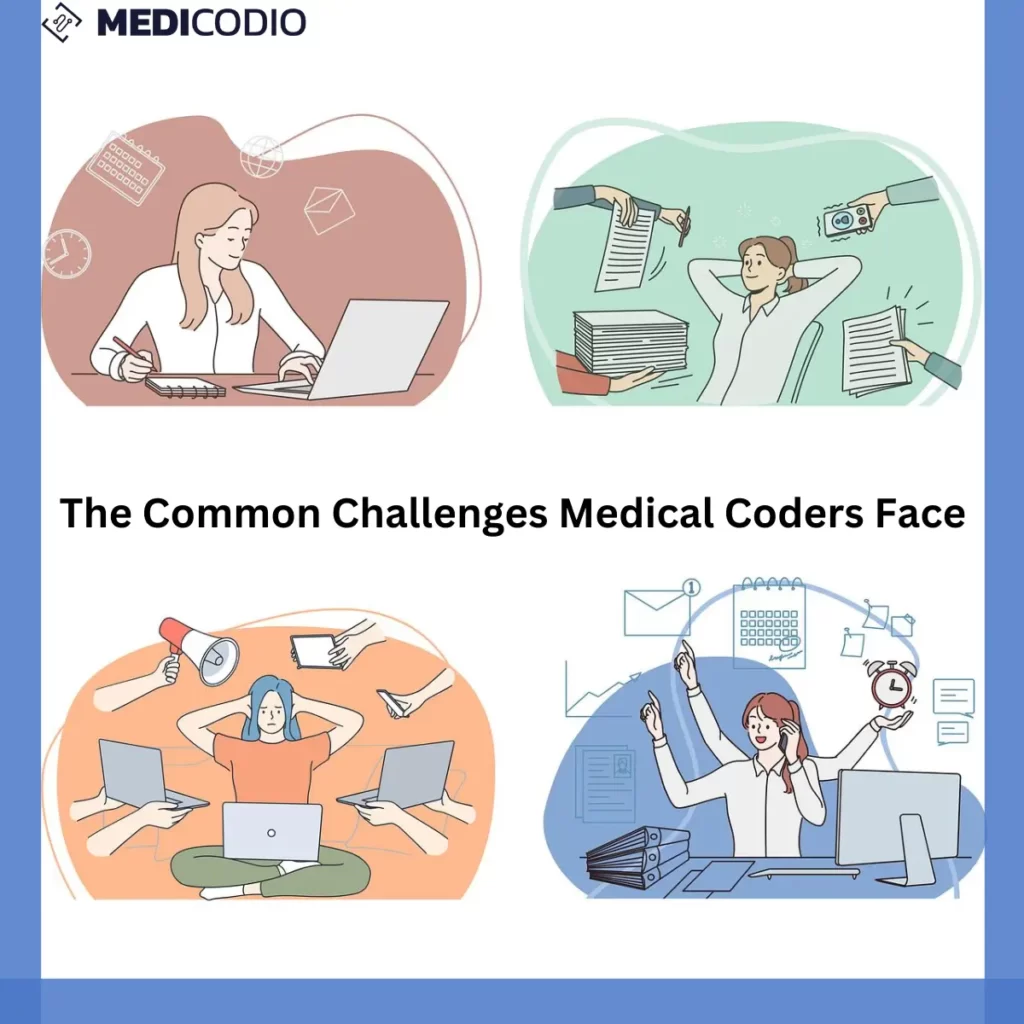Uncover the common challenges in medical coding, from evolving guidelines to precise work under pressure.
First of all, the medical coding process stands as a pivotal link connecting patient care, administrative processes, and financial realms. Medical coding is more than just an administrative task; it’s a fundamental pillar of the revenue cycle management (RCM) process.
The unsung heroes behind this critical function are medical coders, individuals who wield the power to ensure accurate reimbursement, compliance, and the overall financial health of healthcare facilities and RCM companies alike.
According to AHIMA, a typical medical coder can code between 15 to 25 cases per hour, translating to around 120 to 200 cases per day for an 8-hour shift. Let’s have a look at the common challenges in medical coding.
The Common Challenges in Medical Coding:
Complexity of Medical Records: Medical coders encounter a wide range of medical records with varying levels of complexity. Deciphering handwritten medical notes, illegible documentation and inconsistent terminology can lead to errors and delays in coding.
Frequent Coding Updates: The medical coding system, such as ICD-10 and CPT, undergoes regular updates to accommodate new procedures, diagnoses, and guidelines. Keeping up with these changes requires continuous education and adaptation to prevent coding inaccuracies.
Specificity and Granularity: Accurate coding requires a high level of specificity in capturing the exact details of a patient’s condition and treatment. However, healthcare providers may not always provide sufficient information, leading to uncertainty in code selection.
Clinical Documentation Quality: The quality of clinical documentation directly impacts the accuracy of medical coding. Incomplete or ambiguous clinical documentation can hinder the coder’s ability to assign the most appropriate codes, potentially leading to claim denials and revenue loss.
Time Constraints: Coders often work under time constraints to meet billing deadlines. The pressure to code quickly can sometimes lead to errors and oversights, which can negatively impact claim accuracy and reimbursement.
Coding Accuracy vs. Productivity: Balancing coding accuracy with productivity goals can be challenging. While accurate coding is crucial for reimbursement and compliance, focusing solely on speed might compromise coding quality.
Navigating Complex Cases: Some medical cases involve intricate procedures or rare conditions that may not have straightforward codes. Coders need to research and apply a combination of codes to represent the complexities of such cases accurately.
Evolving Regulations: The healthcare industry is subject to evolving regulations and compliance standards. Coders must stay informed about these changes to ensure the codes assigned align with the latest guidelines.
Interdisciplinary Communication: Effective communication between coders, physicians, and other healthcare professionals is vital to resolve discrepancies, clarify documentation, and ensure accurate code assignment.
Audits and Reviews: Regular audits and reviews of coded records are essential to identify potential errors or patterns of inaccuracies. These audits help maintain coding accuracy and compliance.
Remote Work Challenges: In recent times, the shift to remote work due to external factors like the COVID-19 pandemic has introduced challenges related to access to medical records, communication, and maintaining a collaborative coding environment.
Continuous Learning and Skill Development: Medical coding is a dynamic field, and staying updated with the latest coding guidelines, regulations, and technologies requires ongoing training and skill development.
High volume of work: Medical coders often have to code a high volume of medical records. The high workload can lead to coder burnout and errors.
In conclusion, medical coding forms the cornerstone of the healthcare revenue cycle, and the individuals responsible for this essential task, medical coders, play a pivotal role in the financial success of healthcare facilities and RCM companies. To ensure the seamless functioning of the revenue cycle and compliance with industry standards, it is imperative for leadership teams to comprehend the common challenges in medical coding. By identifying the challenges and providing the necessary support and resources, healthcare leadership can empower medical coders to continue their invaluable contributions to the healthcare ecosystem.





